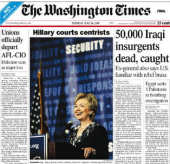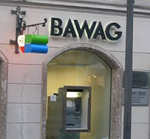 The Washington Times attempted to practice export control journalism a few days ago and did not quite cover itself with glory. In an article titled “Legitimate charities snared in terror net,” reporter Cajsa Collin attempts to argue that OFAC improperly seized monies from European charities that were transiting through U.S. banks:
The Washington Times attempted to practice export control journalism a few days ago and did not quite cover itself with glory. In an article titled “Legitimate charities snared in terror net,” reporter Cajsa Collin attempts to argue that OFAC improperly seized monies from European charities that were transiting through U.S. banks:
On three separate occasions, the two charitable groups had funds seized under U.S. anti-terrorism laws even though neither is accused of any terrorist connections. While most of the money was returned, some is still being held without explanation.
Yikes. That sounds terrible. Bad OFAC! Shame on you, OFAC! Except when you look at the cases, as reported by Collin, the seizures had zip, zero, nada to do with terrorism and the reasons the funds were blocked are, well, blindingly obvious.
The poster child for the Times‘s fright piece is Norwegian Church Aid. According to the story, Norwegian Church Aid “denied any connection to terrorism and a careful examination of the OFAC lists, which are publicly available on the Treasury Department’s Web site, showed that [Norwegian Church Aid] was [never] listed.” Even so, Collins claims, transfers from the group were seized without cause. Collins two allegedly problematic cases of funds transferred by the group being blocked.
Here’s the first:
The first transaction was going to sponsor an American professor for an AIDS conference in Cuba. The money was confiscated in early 2003 but not returned until late 2005,” said Eigil Schander-Larsen, the financial director of Norwegian Church Aid.
Gee, I wonder why that transaction might have been blocked? Hint: it’s not because the Norwegian Church Aid group was thought to be a terrorist group. No, it’s because it looks like the wire must have referenced Cuba and neglected to reference a specific or general OFAC license.
And here’s the second:
“The second transaction [intended for a YMCA branch in Burma] was confiscated in 2004 and, even though we have sent in the paperwork OFAC requires both by fax and PDF file, we still haven’t heard anything. I sent the last reminder in January 2007,” he said.
Apparently, neither Norwegian Church Aid or the Washington Times reporter has ever heard of the Burma sanctions. Section 537.202 of the Burmese Sanctions Regulations forbids the exportation of financial services to Burma. Financial services are broadly defined so that any transfer of funds from a U.S. Bank to Burma — even a YMCA in Burma — is forbidden and must be blocked.
So, the reason that funds in both cases were blocked had absolutely nothing to do with anti-terrorism laws, as claimed by Collins, but by country-specific OFAC sanctions. The fact that Norwegian Church Aid wasn’t on the SDN list didn’t make blocking the transfers improper.
Hint to Washington Times: next time you do a story on OFAC, call an OFAC lawyer before you go to press and say something silly. There are, after all, more than a few OFAC lawyers here in Washington.

 Posted by
Posted by  Category:
Category: 

 This morning we laid our hands on the
This morning we laid our hands on the  The Office of Foreign Assets Control (“OFAC”) released today its
The Office of Foreign Assets Control (“OFAC”) released today its 



